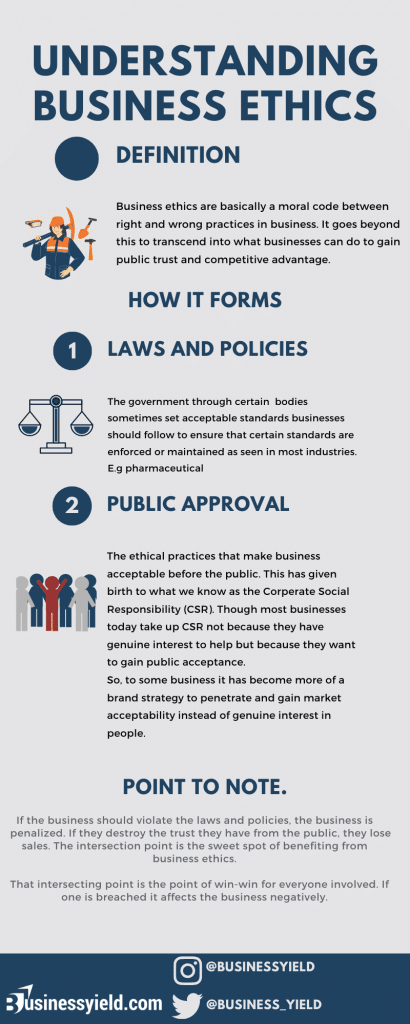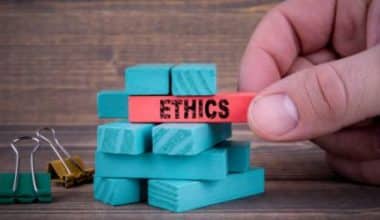How has Business Ethics helped companies and business in the past? What are the pros and cons, how can managers adopt a good organisational culture that helps to ensure they follow beneficial business ethics that would favour their businesses? This is what this journal would show you.
What is Ethics
Ethics is simply a guiding philosophy of what is wrong or right. A set of standards that defines what good practice is and what a bad practice is. Almost every field of study has its ethics. It doesn’t necessarily mean the actions are bad in the real world but are considered bad in their system of running things in that field.
For example in the field of medicine, there are ethics that guides what medical professionals are supposed to do and what shouldn’t be done if one doesn’t want his licence revoked. In some countries, abortion is considered bad ethics and can cost a medical practitioner his license if caught. But on extreme cases of complicated pregnancy issue that aborting the baby is the only option for a pregnant mother to survive, the same abortion is considered a good ethic.
So ethics are standard set and agreed upon to be the guide to what is right or wrong in the course of discharging one’s duties. How does this apply to business?
What is business ethics and its importance?
Business ethics is the study of acceptable practices, policies and guidelines that directs how businesses run their activities. There are 2 major things that determine business ethics.
- The law and government policies: The government through certain bodies sometimes set acceptable standards businesses should follow to ensure that certain standards are enforced or maintained. As seen in most industries.E.g pharmaceutical.
- Public approval: The ethics practices that make business acceptable before the public. This has given birth to what we know as Corporate Social Responsibility (CSR). Though most businesses today take up CSR not because they have a genuine interest to help but because they want to gain public acceptance.
So, to some business, it has become more of a brand strategy (see Google brand strategy) to penetrate and gain market acceptability instead of genuine interest in people.
Read Also: How to use Pricing to gain market entry and market share
Understanding Business Ethics
Business ethics are basically a moral code between right and wrong practices in business. It goes beyond this to transcend into what businesses can do to gain public trust.
Business ethics has evolved when the public started becoming sensitive to how business practices and activities affect society. For example, when telecommunication companies started mounting masts close to homes, people became concerned to how it affects homes close to the locations which forced the telecom companies to unleash compensations plan and roll out corporate social responsibilities for affected communities.
Beyond this, Business ethics attempt to reconcile what companies must do legally versus maintaining a competitive advantage over other businesses. Firms display business ethics in several ways. Therefore beyond gaining the trust of the public businesses try to incorporate ethics that will keep your business ahead of competitors.
Difference between business ethics and organisational culture.
- Organisational culture has a slim difference, it’s a set of standard set and enforced by an organization to mould the behavioural patterns of its workers and management. While ethics are set by the law or policies from government bodies and other external factors that help an organisation gain public trust. Thus, organisational culture is internal practices that increase internal business operations while ethics are persuaded on the business from what is acceptable on the external(society).
- Organisational culture can be formed unconsciously as practices done over time within the organisation can become a culture which makes or Mars the business while business ethics are adopted deliberately and consciously.
The two should not be mistaken or interchange.
Read Also: Organisational Cultures that killed Nokia company
Business Ethics examples [Case study]
Here is a case study. A food processing company A that wants to abide by what is acceptable to the public uses 100% natural ingredient to formulate their food and in order to gain a competitive advantage and win market share might want to include that information on their label but limited by their governing body’s acceptable standard of what should be written and what shouldn’t be written in a product label. Thus has followed ethical procedure but cannot enjoy the competitive advantage that comes with it unless they find a way to communicate the benefit to the public without violating the ethics of the governing body.
Another Business Ethics examples or case study is a food processing company, B that wants to gain market share so on their label they highlight the use of highly rich fibre nutrients to produce their product because of its ability to fight and prevent cancer. But in the true sense, such fibre nutrient is not in the nutritional composition of their product. They might do this to gain public trust and acceptability but will stand the risk to be penalized by government agencies of food-related matters which might cost them closing down the business. which of these Business Ethics examples would you adopt?
How should managers use ethics to their benefits?
In the first Business Ethics examples (case study), business ethic wasn’t favourable for the manager. while in the second, the manager can pull those tactics as long as he isn’t caught. Managers must understand that interest of the public with all wellness, integrity and trust is more important than the interest of the businesses. If the interest of the public is satisfied, the business will thrive and achieve its own interest either in the short run or long run. Managers must understand that intersection point between the interest of the business, the interest of the public, that of the government and other parties involved in trying to implement and adhere to business ethics. That intersecting point is the point of win-win for everyone involved. If one is violated, it affects the business negatively.
If the business should breach the government policy, the business is penalized. If they destroy the trust they have from the public, they lose sales. The intersection point is the sweet spot of benefiting from business ethics.







